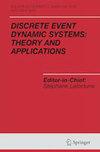Topolitics of the Safe Space
IF 1.6
4区 计算机科学
Q4 AUTOMATION & CONTROL SYSTEMS
Discrete Event Dynamic Systems-Theory and Applications
Pub Date : 2023-07-01
DOI:10.1353/tae.2023.a901579
引用次数: 0
Abstract
Abstract:This paper reflects on the political topology of "safe spaces" today and the logics of their advocacy by minoritized and oppressed groups. To do so, it draws on Derrida, a relentless thinker of aporetic topology. Safe spaces can be described as immunitary structures built or called upon against real and/or perceived threats, whose modes of defense, however, might well threaten the defeat of their purpose. A certain politics of immunity may turn into an auto-immune mechanism whereby, in Derrida's terms, the defense against the perceived external danger turns upon itself and, as such, attacks itself, thus jeopardizing, in the case in point, the democratic ideal it means to uphold. Derrida's political topology and his thinking about democracy can help us tackle the aporetic structure of the safe space as well as the complications—but also the promises—of such political gestures. Conversely, contemporary demands for safety emanating from stigmatized minorities, whether sexual or racial, can help us read Derrida anew by locating his emphasis on immunity and auto-immunity within the trauma-induced politics of resistance to injury.安全空间的拓扑政治
摘要:本文反思了当今“安全空间”的政治拓扑,以及少数群体和被压迫群体倡导“安全空间”的逻辑。为了做到这一点,它借鉴了德里达,一个孜孜不倦的唯心拓扑学思想家。安全空间可以被描述为针对真实和(或)感知到的威胁而建造或调用的免疫结构,然而,其防御模式很可能威胁到其目的的失败。某种免疫的政治可能会变成一种自身免疫机制,用德里达的话来说,对感知到的外部危险的防御转向了自身,因此,攻击了自己,从而危及,在这种情况下,它意味着要维护的民主理想。德里达的政治拓扑学和他对民主的思考可以帮助我们解决安全空间的悲观结构,以及这种政治姿态的复杂性——但也包括承诺。相反,当代对安全的需求来自于被污名化的少数群体,无论是性的还是种族的,可以帮助我们重新阅读德里达,通过将他对免疫和自身免疫的强调定位在创伤诱导的抵抗伤害的政治中。
本文章由计算机程序翻译,如有差异,请以英文原文为准。
求助全文
约1分钟内获得全文
求助全文
来源期刊
CiteScore
3.90
自引率
5.00%
发文量
13
审稿时长
>12 weeks
期刊介绍:
The research on discrete event dynamic systems (DEDSs) is multi-disciplinary in nature and its development has been dynamic. Examples of DEDSs include manufacturing plants, communication networks, computer systems, management information databases, logistics systems, command-control-communication systems, robotics, and other man-made operational systems. The state processes of such systems cannot be described by differential equations in general. The aim of this journal, Discrete Event Dynamic Systems: Theory and Applications, is to publish high-quality, peer-reviewed papers on the modeling and control of, and all other aspects related to, DEDSs. In particular, the journal publishes papers dealing with general theories and methodologies of DEDSs and their applications to any particular subject, including hybrid systems, as well as papers discussing practical problems from which some generally applicable DEDS theories or methodologies can be formulated; The scope of this journal is defined by its emphasis on discrete events and the dynamic nature of the systems and on their modeling, control and optimization.

 求助内容:
求助内容: 应助结果提醒方式:
应助结果提醒方式:


